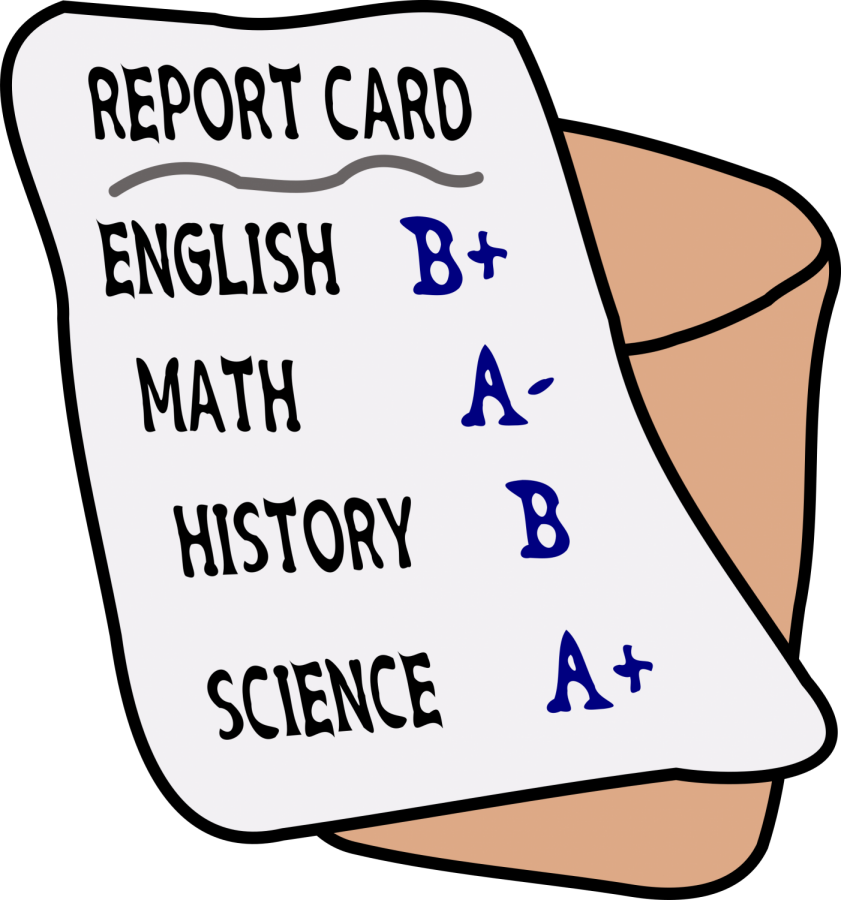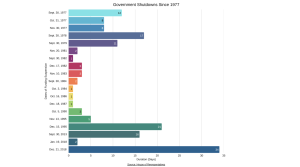Op-Ed: Mason cannot implement universal pass/fail
A clip art of a report card. FCCPS can not switch to a universal pass/fail grading system.
April 2, 2020
On Wednesday, Superintendent Peter Noonan announced that Mason and MEH may follow TJ Elementary in implementing Pass/Fail grading for the remainder of the year. The final decision, we heard, will be made Friday after guidance from the VDOE, colleges, universities, and regional partners. Noonan is confident that any plan will be “supportive of students and faculty.” But implementing Pass/Fail grading will be far from supportive.
Whether it is to attend their dream university, appease their parents, or simply feel a sense of achievement, Mason students spend hours studying, writing essays, and completing homework. The fact is that at Mason, most students don’t work hard just to challenge themselves, they want and need the grade that proves their effort. Shooting for a high GPA doesn’t mean students aren’t learning; just the opposite, it motivates and guides us.
Because it is new to us, Pass-Fail inhibits learning. At Mason, students and teachers only know performance-based grading, a comfortable system based upon criticism and feedback. An A, B, or C tells us what we can do to “learn” better. Students don’t know how to proceed without it. The Pass-Fail grading system eliminates the benefits of a performance-based grading system. Instead of trying to achieve the best grade possible, students are asked to meet a low threshold of passing. Trying to earn an “A” is very different than trying not to fail. Maybe it works if you are used to this system, but we aren’t.
Motivation is going to be important. We are going to be out of school for five months. For most of us, this will be the longest time without face-to-face learning that we can remember. Some may be taking advantage of this time and getting ahead in classes or studying for exams. This isn’t the case for most students. We have been labeled as the “distracted generation” with our dependence on constant stimulus and inability to focus without the threat of discipline. Grades are the motivation we use to stay focused and work hard.
The Pass-Fail grading system encourages procrastination and low-quality work because students feel that it isn’t as difficult. When teachers hand out work in class, we often hear a student call out “is this graded?” If it is, students work hard to demonstrate what they’ve learned; if it isn’t, they usually just put words on paper. This can also be seen when students will more diligently read a text that they have a quiz on it. Because students need to meet a lower minimum to earn credit for the class, there will be a lack of focus on the materials in a pass/fail grading system.
For some students, grades are very important this semester. Most students don’t have perfect transcripts. Most had a bad quarter, a bad semester, or maybe even a bad year. To help students raise their GPA before college applications are due, Mason offers a significant number of weighted classes, where you can earn up to a 5.0 as opposed to a 4.0. It is unclear now how pass and fail grades will be represented on a student’s transcript, but an unfortunately-timed pandemic shouldn’t risk students’ chances of getting into their dream school. Universities, we are told, will “understand” that students had Pass/Fail grades for a semester, but they won’t understand that a few bad grades weigh down and misrepresent a student’s GPA when they weren’t given the opportunity to raise it. It is likely that GPAs will be more important this year than in the past with SATs and ACTs being canceled worldwide. The GPA will be an even bigger indicator of a student’s academic ability.
Finally, like it or not, the pressure of grading can lead to structured and healthy learning habits that aren’t as necessary when the goal is to just pass. George Mason is a highly competitive school and our reaction to our grades reflect that. Students either proudly flaunt report cards adorned with A’s and 4.0s, or hide them in shame of their “sub-par” grades. The emphasis on grades is a cultural phenomenon that has existed for generations at Mason; we are an “A” student, a “B” student, a “C” student. This identification can cause stress and anxiety, but so can not getting a grade at all. When a student completes an assignment, a grade as a “reward” for the work is a positive and helpful stimulus.
The biggest concern about continuing performance-based grading in an online environment is that students have different access to online resources and different home environments in which to complete work. Some students have to care for younger family members or don’t have reliable internet. This is where Pass-Fail grading should be implemented on a voluntary basis. Students that have certain restrictions barring their learning should be given an easily accessible way to explain their situation and have a different system implemented for them. Mason could follow in many universities’ footsteps and create an optional pass/fail system where students can choose to take classes for grades or not; this is similar to the system already in place for online classes such as personal finance. A more radical option could be to offer a “universal pass” — meaning that nobody would fail, regardless of performance, but students can still take classes for grades.
It is impossible for us to effectively switch to a Pass/Fail grading system without losing what makes Mason students perform so well. This is a trying time. Things will forever be changed by what occurs in the following months. But in an effort to restore some normality to this crisis, keep grades. Students deserve a gold star on their report card now more than ever.









